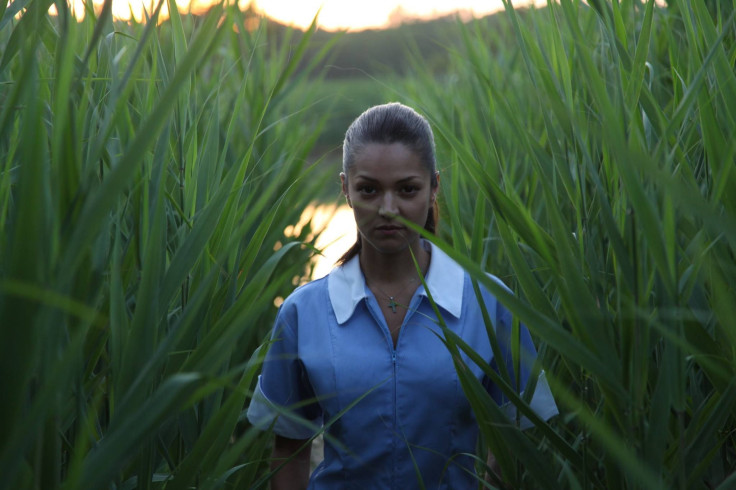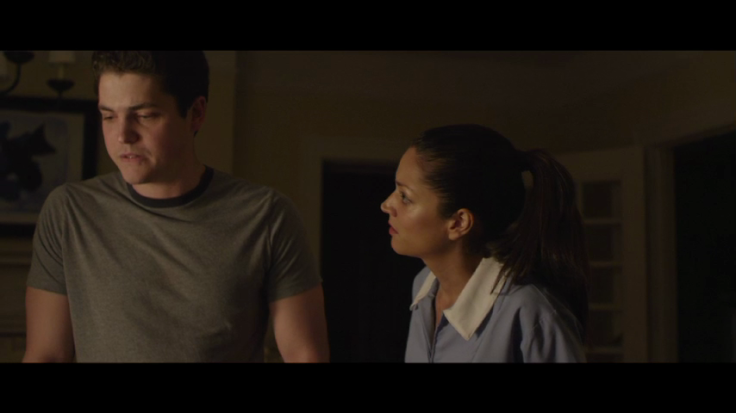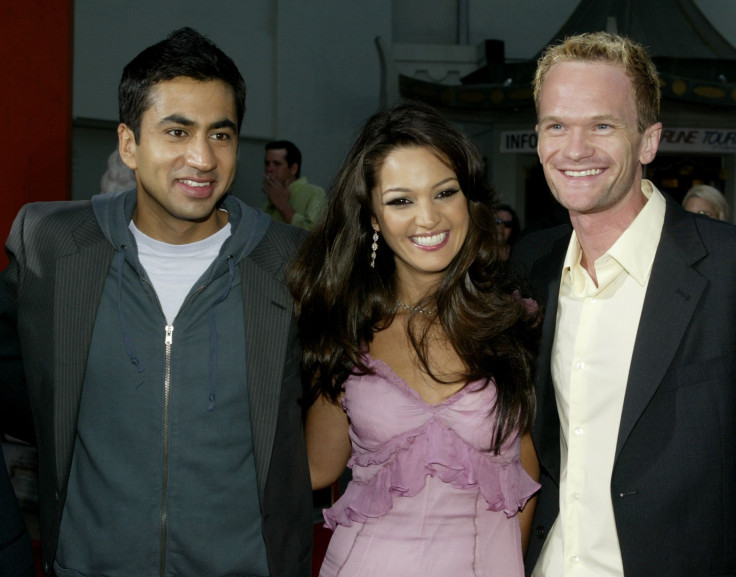
If you’re familiar with the “Harold and Kumar” series, then you definitely know Paula Garcés, the gorgeous Latina who played Maria, Harold’s love interest who ends up becoming his wife. Paula, more than a pretty face, is a busy actress who has worked on numerous movies and TV shows, including “Clockstoppers,” “Marci X,” “Man of the House,” “National Lampoon’s Pledge This!,” “The Shield,” “Devious Maids,” among many others. She is now starring in the psychological thriller “The Maid’s Room,” in which she plays Drina, an attractive, intelligent immigrant who takes a job for the season as live-in maid.
In the film, out August 8, Drina is supposed to look after her bosses’ son, Brandon, who is vacationing in the house. Since the maid’s room is next to the garage, Drina can’t help noticing when Brandon returns late one night, noisily and obviously drunk. The next day, she sees that Brandon's car is battered and bloodied and, when she reads in the local paper that there has been a fatal hit and run, it's clear who's responsible. Drina realizes that by knowing this, she has some power over her employers, but this places her in far more danger than she imagines.
Latin Times spoke to Paula, who opened up about this new project, being a teenage mom, and why she has taken two roles playing a maid, regardless of the backlash that “Devious Maids” suffered for featuring gorgeous Latina women portraying housekeepers, allegedly “promoting the stereotype.”
Latin Times: Let’s start with this new project. What motivated you to accept the role of Drina in “The Maid’s Room”?
Paula Garcés: When I first got the scrip I was told if I was interested to read it, so I read it and I fell in love with it. Michael Walker the writer/director did a fantastic job of keeping you in suspense from the very first scene, and I really fell in love with the character of Drina, and I quickly realized that I had to audition for the role. I was very motivated because I’m extremely competitive and it was something that I had to work really hard for, and when I got the role I was very pleased because I got it the good old fashioned way.
LT: How would you define your character? Do you feel you might have some similarities with Drina or not at all?
PG: I really connected with the character, I loved her sense of right and wrong and how doing the right thing is a really clear decision for her, and I liked the fact that she was very intelligently written, and that she was ambitious, and I connected with her in a lot of levels. In real life she’s basically an underdog, but to her she’s really a person who dreams big and is not afraid to take chances. She came to this country and she doesn’t have papers, they offer her the job to clean a house and she always finds the bright side of things, so I’m hoping that I have a lot of similarities with the character because she has a lot of traits that I find admirable.

LT: What was the best part of the whole shooting experience?
PG: We only had 18 days so everything had to be really precise. I loved the way Michael Walker works, the director of photography was extremely crucial and really talented, the music… everything that came together. I liked the fact that was a lot of teamwork and there was no time to waste so it really kept me on my game. It was basically like doing a play every day because we didn’t have a lot of time for a lot of takes, we didn’t have a lot of time to experiment. It was basically like “This is what the script is, this is what the scene is today, this is our mission and this is what we have to accomplish. If not, there’s no movie.” So I really had to stay on my game.
LT: How do you feel with the final result?
PG: I think this film is fantastic, I’m really proud of it. It’s obviously a small movie, it’s not a Hollywood studio film, but I’m very proud of it and hope that it does well because I’m pushing for it. Whoever is willing to listen to me about the film, I’m willing to talk to them because it really is a fantastic film. It was done in a very short amount of time with very little money, but if you look at it, it looks really expensive, it was shot beautifully, the score of the film is absolutely wonderful, the acting… and it just really reminds me of old Hitchcock with an Edgar Allan Poe’s sort of twist, and it just looks like a big Hollywood production and not a lot of independent films have that look anymore. It keeps you in suspense from the very first scene, and very quickly it unfolds, and you realize that this maid is in some real trouble and she needs to figure out a way to get herself out of it. It really touches upon some heavy themes of immigration, power vs. weakness, good vs. bad, rich vs. poor, and it doesn’t beat you over the head with it, but it’s definitely a conscious film with some really cool messages. There’s a lot of questions asked and one of the big questions is “What would you do if you were in this situation?” and “What would you do if your child was in this situation?” “Would you act like this?” “Would you let them get away with this?” It all depends on the person that you speak to about the film.
LT: Paula, let’s switch it up a little bit and talk about yourself. You were born in New York, moved to Colombia and then came back to the city, is that right?
PG: You’re absolutely correct.
LT: How was that whole process? How long did you live in Colombia? How old were you when you moved back to New York…?
PG: When I moved to Colombia I was about 4 or 5, and then I came back when I was about 8 or 9. My experience in Colombia was beautiful. It’s part of my childhood memories that I most enjoy and that I most love. When I went to Colombia I completely forgot English so I really consider Spanish my first language. And then when I came back to New York I had to relearn English, I went into the 3rd and 4th grades and really stayed in New York and really stayed true to being a New Yorker. Growing up in NYC had all sorts of beautiful challenges and opportunities and I took advantage of every single one of them. And thank God to my mom who was a single mother of two girls, and raised us in Spanish Harlem in the early 80s and 90s when it wasn’t necessarily a very friendly place to grow up in, but it taught me a lot of lessons, and she was always interested in the arts, and because of her I’m an actress today. She didn’t really wanted me to hang out anywhere dangerous so she would tell me “You gotta go audition for this,” and “You gotta get a scholarship for this dance school,” or this acting workshop, and because of that I fell in love with acting and luckily very quickly I started getting roles in commercials and TV and film and that’s how my career started in New York.
LT: What was your biggest challenge in this whole process of auditioning and getting roles?
PG: The challenges have evolved. When I was young it was hoping to get a job. Then I got pregnant as a teen so the challenges again changed. The challenges were “I hope my agents and managers are still willing to send me out on auditions,” “I hope I can get a babysitter so I can go to this audition.” When I got the job was “Oh shoot! I got the job. Hopefully they pay me enough so I can still take care of my child and do this film or do this TV show.” So that’s what I love about acting. There’s always a challenge and you never know at all. It’s not a career where you’re an expert at it. You’re never an expert at acting, you’re never like a master at acting. I’m always completely willing to learn and evolve with those challenges. And I think that’s what I love the most about acting. I’m a very competitive person, I still like the auditioning process. Even though I’m in a different stage in my career, I’m a little luckier and I do get offered roles that are very cool and that I don’t have to work as hard for, but then there’s some other roles that people would be surprised to know that I fought for them, that I had to audition for them. And when I get those roles, those are the ones that I’m the most… The harder you work at something, the more you appreciate it.
LT: You have two kids now. How do you balance being a mom and being an actress at the same time?
PG: You know, I can bore you and say it’s really hard, but actresses are very spoiled. There are millions and millions of women who work 9-5, running to go get their kids from after-school or the babysitter, and doing it all and being amazing. So I tilt my hat off to those women and won’t bore you with the details of what I have to do because I have a lot of help. I have a lot of help, and a lot of love and I’m very lucky that way, and even when I got pregnant as a teen, I had a lot of help and very quickly started making money in acting which is ridiculous. It’s the most ridiculous thing, I still can’t believe I get paid for what I do. I have a lot of fun making believe and playing dress up and I get paid for it and give my kids very good lives because of it.
LT: You have been in so many TV shows and movies, what would you say has been the best character to play?
PG: That’s so hard! I’ve been very lucky to work with very good writers, actors, artists, musicians, just people who are extremely talented and wonderful and interesting people. And to pick one role is really really hard. I had a fantastic time shooting “The Maid’s Room” and I loved this character. This character hit home for me on a lot of levels. I wanted to make my family proud, I wanted to make my community proud because I felt I was also representing a large portion of my Latin heritage and my Latin community especially in this country. I felt I was representing a little bit of the struggle of immigrants in this country, so I’m proud of this film. I really have enjoyed the journey of this film, so for now I could say this is one of my favorite characters, but I’ve really enjoyed playing cops, lawyers, astronauts and hookers and the girl next door. “Harold and Kumar” is celebrating the 10 year anniversary and I’m still in love with Maria. I still get recognized as Maria, people wanna know about Maria. So much so that we’re doing the animated series now. So a favorite character is really hard.

LT: Besides Drina in “The Maid’s Room,” you’ve also portrayed a maid on “Devious Maids,” a show that got a lot of backlash for having Latina women portraying maids because people criticized the “stereotype.” How do you feel playing a maid yet again and wanting to make your people proud?
PG: I find that completely ridiculous, although I try not to judge people for their opinions because they have the right to express them, but I feel that the way you break a stereotype is that you go into it, dissect it, and pay a homage to it. There’s a lot of truth in stereotypes and I’m just in awe, because most Latina women in this country when they come undocumented, that’s what they do. You clean houses, you babysit. And the thing is that that “stereotype,” if you want to call it a stereotype, it rang true in my family. My grandmother migrated to this country in 1965 and she was a maid. And she did it with humility and she did it with passion and she was proud of it. And because of it she was able to bring her whole family, she was able to feed her kids, educate her kids, and so much so that I was able to dream ridiculously big and achieve my dream of becoming a Hollywood actress because of that. I think that there’s no shame in being a maid. Why? So if I was portraying a lawyer that’s better than a maid? And I just didn’t get that. Why is the lawyer’s story more important, or should be told more than the maid’s? A maid’s story to me is just as important and just as interesting as if you tell me the story of a lawyer or a scientist. I just didn’t identify with that whole controversy.
© 2025 Latin Times. All rights reserved. Do not reproduce without permission.





